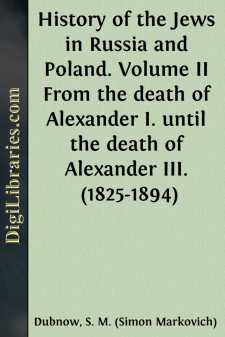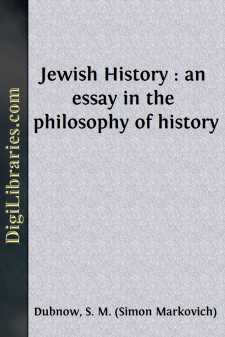Categories
- Antiques & Collectibles 13
- Architecture 36
- Art 48
- Bibles 22
- Biography & Autobiography 813
- Body, Mind & Spirit 142
- Business & Economics 28
- Children's Books 17
- Children's Fiction 14
- Computers 4
- Cooking 94
- Crafts & Hobbies 4
- Drama 346
- Education 46
- Family & Relationships 57
- Fiction 11829
- Games 19
- Gardening 17
- Health & Fitness 34
- History 1377
- House & Home 1
- Humor 147
- Juvenile Fiction 1873
- Juvenile Nonfiction 202
- Language Arts & Disciplines 88
- Law 16
- Literary Collections 686
- Literary Criticism 179
- Mathematics 13
- Medical 41
- Music 40
- Nature 179
- Non-Classifiable 1768
- Performing Arts 7
- Periodicals 1453
- Philosophy 64
- Photography 2
- Poetry 896
- Political Science 203
- Psychology 42
- Reference 154
- Religion 513
- Science 126
- Self-Help 84
- Social Science 81
- Sports & Recreation 34
- Study Aids 3
- Technology & Engineering 59
- Transportation 23
- Travel 463
- True Crime 29
History of the Jews in Russia and Poland. Volume II From the death of Alexander I. until the death of Alexander III. (1825-1894)
Description:
Excerpt
CHAPTER XIII
THE MILITARY DESPOTISM OF NICHOLAS I.
1. MILITARY SERVICE AS A MEANS OF DE-JUDAIZATION
The era of Nicholas I. was typically inaugurated by the bloody suppression of the Decembrists and their constitutional demands, [1] proving as it subsequently did one continuous triumph of military despotism over the liberal movements of the age. As for the emancipation of the Jews, it was entirely unthinkable in an empire which had become Europe's bulwark against the inroads of revolutionary or even moderately liberal tendencies. The new despotic regime, overflowing with aggressive energy, was bound to create, after its likeness, a novel method of dealing with the Jewish problem. Such a method was contrived by the iron will of the Russian autocrat.
[Footnote 1: See Vol. I, p. 410, n. 1.]
Nicholas I., who was originally intended for a military career, was placed on the Russian throne by a whim of fate.[1] Prior to his accession, Nicholas had shown no interest in the Jewish problem. The Jewish masses had flitted across his vision but once—in 1816—when, still a young man, he traveled through Russia for his education. The impression produced upon him by this strange people is recorded by the then grand duke in his diary in a manner fully coincident with the official views of the Government:
[Footnote 1: After the death of Alexander I. the Russian crown fell to his eldest brother Constantine, military commander of Poland. Accordingly, Constantine was proclaimed emperor, and was recognized as such by Nicholas. Constantine, however, who had secretly abdicated some time previously, insisted on resigning, and Nicholas became Tzar.]
The ruin of the peasants of these provinces [1] are the Zhyds. [2] As property-holders they are here second in importance to the landed nobility. By their commercial pursuits they drain the strength of the hapless White Russian people…. They are everything here: merchants, contractors, saloon-keepers, mill-owners, ferry-holders, artisans…. They are regular leeches, and suck these unfortunate governments [3] to the point of exhaustion. It is a matter of surprise that in 1812 they displayed exemplary loyalty to us and assisted us wherever they could at the risk of their lives.
[Footnote 1: Nicholas is speaking of White Russia. Compare Vol. I, pp. 329 and 406.]
[Footnote 2: See on this term Vol. I, p. 320, n. 2.]
[Footnote 3: See on this term Vol. I, p. 308, n. 1.]
The characterization of merchants, artisans, mill-owners, and ferry-holders as "leeches" could only spring from a conception which looked upon the Jews as transient foreigners, who, by pursuing any line of endeavor, could only do so at the expense of the natives and thus abused the hospitality offered to them. No wonder then that the future Tzar was puzzled by the display of patriotic sentiments on the part of the Jewish population at the fatal juncture in the history of Russia.
This inimical view of the Jewish people was retained by Nicholas when he became the master of Russian-Jewish destinies....



